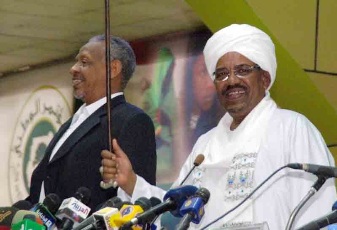No ‘Arab Spring’ will occur in Sudan anytime soon, Bashir says
November 23, 2011 (KHARTOUM) – The Sudanese president Omer Hassan al-Bashir dismissed speculations about a possible ‘Arab Spring’ in his country suggesting it is a far-fetched scenario.

He stressed that the Arab Spring in Sudan already took place through his bloodless coup which he led in 1989 against the democratically elected government of al-Sadiq al-Mahdi.
Bashir also revealed that the new cabinet will be formed in the coming days with what he said is wide participation from political forces.
The Sudanese leader said that the dialogue with political parties over the prior period will form a seed for crafting the new constitution.
But Bashir mocked those who talk about worsening economic political situation saying that they are the same ones riding luxurious cars, eating the best food and are safe in their homes.
He also vowed to crush the rebellions staged by the Sudan People Liberation Movement North (SPLM-N) in the Blue Nile and South Kordofan states.
On the economic side, Bashir said that his party is working on combating poverty, curtailing government spending and addressing economic conditions resulting from the separation of the south and loss of the vast oil reserves as a result.
The NCP general conference will discuss amendments to the party’s statute which are expected to generate a lot of debate.
Mustafa Osman Ismail, NCP foreign relations officer, was quoted by Sudan official news agency (SUNA) as saying that changes will include percentages of representation at the General Conference or the Shura, or at the state level.
He said that the purpose of this is reducing the rates of selection and increasing rates of the sectors that come through conferences. He added that the proposed changes reduce selection rates from 10% to 5% and elevation across sectors from 20% to 15%.
There will also be increases to participation rate of youths and women in party structures, Ismail said.
(ST)
